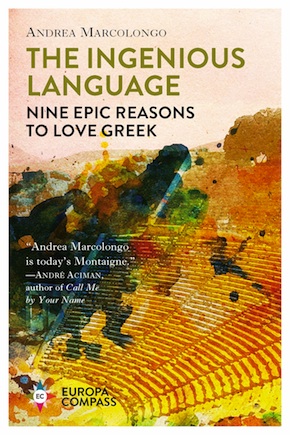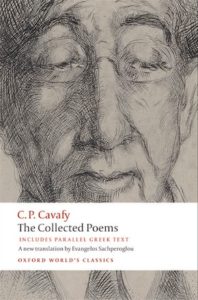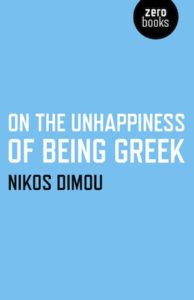Modern fiction
by Mika Provata-CarloneReading Andrea Marcolongo’s The Ingenious Language: Nine Epic Reasons to Love Greek in certain ways lives up to its English title in providing an epic experience (the Italian original’s simpler 9 ragioni… emphasises the more light-heartedly catchy, yet didactic underpinnings of the text, rather than its epic claims, significance or proportions). As Marcolongo reminds us throughout, in engaging with the Greek language (or even with the Greeks) we are meant to brace ourselves for a heroic encounter, and in immersing ourselves in her text, we should expect to feel at least some of the awe of such an epiphany or revelation.
There are many mighty proclamations in this slim, yet formidably dense volume, and some equally Herculean disclaimers, which make for a thrilling journey, sometimes too close for comfort to the qualifying adjective’s little cousin, thriller. Overall, these points and counterpoints, claims and counterclaims build up to an impressive rhetorical crescendo which is sustained, Verdi-like, self-assured and monumental, across the seven chapters of her main arguments, and the not to be overlooked introduction, bibliography and acknowledgements. It is both an exhilarating sentiment and a perplexing one: the reader sometimes feels as though Marcolongo would like to feel herself a fearless deliverer of Ancient Greek from the shackles of school syllabi – and even (or especially), as she also points out continuously, from the living ghosts of Modern Greece. Highly exuberant, impressively undoubting of its eminence, her Ingenious Language is written in a style that would like to emulate some of the most inspired examples in the tradition of great essay writing – perhaps Montaigne, for a sense of introspection and self-reflection, explicitly Woolf, for the extraordinarily personal quality of her calm incisiveness and brilliant objectivity, more audaciously Blanchot, for the esoteric flights of fancy, or Michel Foucault, for the cult and aura of post-structuralism – for she thrives on virtuosic etymological ad-libbing, analyses of fictional constructs, conflicting tensions, the politics of knowledge-claims and interpretations, the reader’s primacy (in this case the academic learner of ancient Greek) as regards the entitlement to ownership and exegesis, which subsists in tacit tension or even opposition to the author’s intended meanings (for author, see here the Greeks themselves).
Magisterial, unquestionably remarkable in its effort to encompass in barely two hundred pages the breadth and scope of a language, its soul and its fundamental mechanisms, revealing it to us in all its splendour as a living organism, as well as tackle the truly massive philological, hermeneutical, historical and literary scholarship it has engendered, The Ingenious Language is from the start a hybrid, even eccentric phenomenon. It would like to see itself as a definitive user’s manual, suffused with unprecedented brilliance and unique insight – both claims Marcolongo makes herself on various occasions along the way, and perhaps the Italian title, La lingua geniale, which echoes the usage of the French génial (as in c’est vraiment génial, ça!), might have been rendered more aptly in English as “The Brilliant Language”. It equally positions itself as a fervently confessional lover’s elegy, the whole aiming for a methodical, anatomical analysis of grammatical and sociolinguistic concepts, which runs organically in parallel with a lyricised stream of consciousness intended to poeticise philosophical pronouncements and create a free-flowing rhetoric of argumentation. It is spectacularly rich in the material it tries to introduce, the level of detail it aspires to attain, the intended focus on erudition, and the delicate balance between the relish of cognoscenti for minutiae, and a shared delight for the broader, more popularly accessible canvas.
There is an initial sense of enchanted beauty and intoxication in Marcolongo’s commanding authorial gestures and assertive self-definition, which remains euphoric until one begins to tire of what can feel like mere indulgence, or even obfuscation.”
Sadly, however, neither the method nor the concepts eventually become all that clear in the process, and it is often frustrating to see pure elements of structure or morphology given a convoluted, obscurantist garb simply in order to elevate them (supposedly) to a higher plane of semantic existence. There is an initial sense of enchanted beauty and intoxication in Marcolongo’s commanding authorial gestures and assertive self-definition, which remains euphoric for some of the time, until one begins to tire of what can feel like mere indulgence, or even obfuscation, Heideggerian subterfuge, or plain lack of clarity, scholarly integrity or precision. There are too many a priori conjectures, unwarranted exegeses of words and aphoristic generalisations of principles that may or may not subsist, too much intellectualisation of ‘storytelling’ theory, a saturation of emotive/philosophical metatextual interpretations, and a hefty dose of unprocessed paraphrasing of secondary academic sources. All of which ultimately mar the proposed objective of confronting head-on the presumed complexities of Greek, in order to open up the way once and for all to a beguiling kingdom of wisdom, self-knowledge, community and communication – the world of Virginia Woolf’s On Not Knowing Greek, on which Marcolongo relies heavily (but not quite faithfully) for many of her spirited readings.
In many ways it resembles the syntactical structure of a subordinate German clause, where one must hold one’s breath (sometimes interminably) in order to scan the horizon printed on the page for that verb lurking at the very end, which alone can offer semantic illumination. The Ingenious Language ought perhaps to be read in a back-to-front or even boustrophedon manner: starting with the acknowledgements and bibliography, then the last chapter on ‘Greek and Us: A History’, before one resumes the tale from its intended beginning with the introduction. Doing so helps the reader locate the ‘action verb’ of Marcolongo’s ultimate stance on the state of Greek as a language, and of Hellenism as a human category, which together form the motive agency behind The Ingenious Language, as well as illustrating her perception of herself as the agent of her discourse. In the acknowledgements, Marcolongo adopts a peculiar variant of Ovid’s tone in the Tristia coupled here with an Edith Piaf defiance: “I promise never to betray myself and to continue studying Greek – most of all, in order to know myself.” She offers “thanks to all those who were and are no longer my friends, because you never forgave me for being happy. Thanks to those who hurt and abandoned me, thanks to those who told me this would be impossible, thanks to those who forced me to apologise for succeeding in doing what I have always wanted to do: write. Thanks to you, I have learned a lot – especially who I am not.” It is an Amazon’s battle cry, fearsome, especially, in the astounding decision to include it in what ought to have been a book about a language, its extraordinary powers of meaning, its resonance across the vortices and dunes of time… In the bibliography (still reading palindromically), Marcolongo asserts her unique expertise with yet another rather startling proclamation: “I have consulted dozens of texts in order to put down in black and white my insights, hang-ups, feelings, and stubbornly held opinions concerning the Greek language, which I have cultivated over fifteen years of vigorous debate and heated discussions between me, myself, and I… Maybe ‘the strangeness in my mind’ [which she liberally borrows from Wordsworth’s Prelude] really is to blame, or my special sixth sense for Greek: the fact is, today I think in ancient Greek” (added emphases).
These are theses (not just confessional assertions) that will appear time and again throughout Marcolongo’s text, a double buffer against any critical analysis of her positions or any reservations regarding her qualifications: she is proud to have studied in a liceo classico (the Scuola Holden di Baricco, a vital part of her identity) and to have majored in Classics as an undergraduate. Added to these academic credentials is her professional experience as a journalist and as a speechwriter for former Italian PM Matteo Renzi, in short an ambitious, focused, practical training in sociopolitical storytelling, and a keenly pursued engagement with mainstream media, where she has appeared on numerous panels and cultural talk shows to discuss what she terms “storytelling, historia, epos”, fake news, the very notion of ‘mainstream’, the easy toxicity of propaganda or, as one of her interlocutors added on one occasion, the all-powerful art of story-making. She has the same burning intensity when she writes as when she speaks, holding an equal fascination between curiosity and bewilderment – for the sheer physicality of her utterances in both forms, for the intricate fabric of messages she so carefully weaves together, while being subtly elusive as regards their more concrete significance.
She uses a profusion of literary quotes, but none are post-Classical Greek to see how the language she traces down to Herodotus, Thucydides and Isocrates may have found its way to expressing the shared consciousness of a different moment.”
In The Ingenious Language Marcolongo will summon her very impressive arsenal of rhetoric and set out to retell, or perhaps remake, the story of the Greek language, the Greek people, Greek history, nous, time. And the sadness, from which her book offers little consolation (to borrow Woolf’s term), is that for all the “dozens of texts” she has consulted, the more than a dozen texts she has read, translated in the course of her studies, reread in her proclaimed love affair with Greek words, their sounds, their tonalities and inexhaustible richness of denotation and vital meaning, she does not seem to be able to look beyond antagonistic polarities: ancient vs. modern; academic vs. lived (living) tradition; purity of a moment frozen in time (classical antiquity) vs. the flesh and blood of the modulations of a language and its people, its sense of being in flux and in motion, in a dance through and with time, its traumas and tragedies, good fortunes and adversities, its particular chapters and volumes of history, its algos and its dreams of happiness. Her final chapter, ‘Greek and Us: A History’, is an especially heated, if chaotic, Philippic: through the rationalising device of the Koine, a later stage in the development of Greek that became for a time the lingua franca not only of the Hellenistic world but also of much of the Roman empire, continuing into Byzantium, flexing and stretching its muscles through the Ottoman rule, and still spoken in its evolved form by Greeks today, Marcolongo makes the axiomatic claim that one must establish an absolute caesura, an intolerant, exclusionary Caesarean section between her Greek and Greeks, and anything or anyone that came after, which transpires in her writing as being mutant, ersatz, adulterated or even fabricated fiction, modern fake news.
Building on a simplified miscellany of theories on the Indo-European development of languages, and sadly on very little or no history, cultural or factual, Marcolongo declares that because of Koine, “Greek no longer belongs to a particular region nor to a particular people.” It is simply an abstraction, orphaned and incorporeal, cultural flotsam and jetsam washed up by the storms of time on a globalised shore, on which anyone can lay carte-blanche claim. There is no distinction between linguistic metropolis and diaspora, no survey of what literary production might have existed in the periphery or by the epigones of what the Greeks might perhaps have understood as the Hellenic world proper. Whereas other languages with vast dissemination (and sociohistorical and cultural evolution) can happily make the distinction between the original umbrella language and its topos (think Portuguese, English, French, Spanish, Arabic, or even German) and the variant by evolution or adoption, Marcolongo’s Greek cannot. In the first case, the original still belongs somewhere, to someone, even if it may have been shared, and the wondrous beauty is to see the old and the new in tandem, as well as in contrast and comparison: Creole French possesses its own extraordinary life, its own dreams, stories, wounds and healing panaceas. To confuse it with the French of France would be to strip it of its history, the body of its people, the soul of its journey through time. Greek, however, cannot benefit from such a “two distincts, division none” understanding of a common humanity and a discrete existence, since it did not branch out and create families of offspring (Cypriot Greek, anyone? Calabrian Greek? Pontic Greek?), but instead “is the one language in Europe that continued to change from within and never turned into something other than itself.” Ignoring the repercussions for languages, discrete linguistic production, culture-specific literary creation and voices, and for literary traditions as a whole, Marcolongo proclaims, in an astounding coup of cultural levelling and assimilation, that “what is clear is that when a language becomes everybody’s, it automatically becomes nobody’s.” Greek was thus “sapped of almost all its original meaning” – and as for modern Greek, apparently it is archaic, incomprehensible to all, even to the Greeks themselves, who need “to find the will to finally reconstruct a modern idiom which would enable all Greeks to understand one another and make themselves understood today, both within their borders and more importantly without” (added emphasis). The “modern idiom” is not specified, nor does Marcolongo offer any evidence for her claim that Greeks do not understand Greek, except to cite the debate on a (no longer extant) purist (archaising as she calls it) version of Greek, which, even though it was radically challenged from as early as 1861, she asserts is still the hydra of Greece today. From a spurious salade russe of modern Greek genealogy, history and linguistics, she proceeds to a highly politicised onslaught against modern Greece/Greeks, the motivation of which is both dubious and concerning, as well as being, yet again, shockingly unsupported by any evidence: “As a matter of fact, Greece now speaks a modern Greek that borrows heavily from ancient Greek [added emphasis]; in doing so, it reaffirms its identity as the people with the most impressive cultural past in the West. Yet as a people, the Greeks seem incapable of getting out from under the past, and they are constantly fighting for a present that has thus far failed to arrive – the future, on the other hand, was invented only a few centuries ago.” Since 146 BC (one assumes), when the Romans sacked Corinth, the Greeks can never be allowed to breathe as Greeks. They have failed not simply to arrive but even to ever ‘depart’ from a past Marcolongo intends to keep securely away from their reach. They are mere inventions of themselves, figments of their own imagination. It is a rather insipid, if vitriolic rehashing of the Gibbonian view of history, which seems to preoccupy Marcolongo throughout The Ingenious Language, a political agenda that pollutes whatever insight into Greek she may have had to offer so far.
The Greeks are not difficult to understand because they and their language no longer exist, but because one needs to create the language and the culture that will connect two different living traditions.”
Marcolongo cites a few modern Greek words to compare them with ancient Greek; oddly enough, they always seem to correlate happily with one another, even when she seems to ignore vast populations of words, out of which she singles out a couple of ‘unique’ and ‘disused’ exceptions. She also casts about axiomatic assertions which are bewilderingly false, such as “the plural genitive was discarded” (thankfully it is still there and very much alive). Yet she does not offer any information as to her own knowledge of the language. She uses a profusion of literary quotes, but none are post-Classical Greek – no Anna Comnena, the Patristic texts, Photius, Psellus or Erotokritos, no Cavafy, Seferis, Ritsos, Elytis, Venezis, Kazantzakis, Scarimbas, Myrivillis, Politis, Karkavitsas, Papadiamantis, Lorentzatos (one could go on for a very long time), to see how the language of what she traces down to Herodotus, Thucydides and Isocrates as a ‘people’ may have found its way to expressing the shared consciousness of a different moment in their time of reflection, inflection, or even pause and stillness. The exception is the not uncontroversial Nikos Dimou, whose writings she interprets on a highly reductive, verbatim level, quotes very selectively, as well as paraphrasing them unattributed rather liberally, and appearing to offer them as her own conclusions and assessments – ignoring their eccentricity, their inherent Socratic irony (or their Gorgias-inspired dialectics), their own very specific political moment in time. The collection of aphoristic statements she relies on was written, Dimou has insisted, as “my reaction to the Greek Junta”, a period of political crisis that lasted between 1967 and 1974, which included a stilted adoption of Classical models to enhance a sense of false patriotism, as well as imposing an equally stultified form of mock-Attic Greek. With the Junta’s fall, Greece entered a particularly intense period of active debate on its relationship with time and diachronicity, which Marcolongo seems to ignore (or suppress), as she does the fact that the material she draws from Dimou dates back a good fifty years, rather than reflecting any moment that came after…
Moving from tail to head, Marcolongo begins her narrative of story-making with Virginia Woolf’s essay, once again interpreting verbatim Woolf’s rhetorical device of using the purported impossibility of understanding the Greeks or their language as an intentional trope, as a way back to what they can offer us, how they can join us, how we can join them in our quest for meaning, humanity, connections that counter the (highly ideological) artifice of defamiliarisation, of scientific objectification, of dehumanisation, and essentially deculturation. It is a device Woolf uses throughout The Common Reader, where Elizabethan drama is “that jungle, forest and wilderness [leaving us] overcome by the extraordinary discrepancy between the Elizabethan view of reality and our own”, where “nothing happens to us as it did to our ancestors” (this on Chaucer), where the ‘strangeness’ of the past, the claim by authors or people now long dead to possess an individual, ‘other’ space, is precisely what makes them so intimate to us, so vital as the echoes of an ongoing harmony forever being built across humanity and time.
Woolf writes that we cannot know Greek, since “between this foreign people and ourselves there is not only difference of race and tongue but a tremendous breach of tradition”, a semantic aporia, at first glance, between Greece and its way of relating to time and eternity, and her own English world, the “slow reserve, the low half-tones, the brooding introspective melancholy of people accustomed to live more than half the year indoors.” The Greeks are not difficult to understand because they and their language no longer exist, but because one needs to create the language (and the culture) that will connect two different (living) traditions. That bridging language cannot be conceptual, analytical, taxonomical: “it is not because we can analyse them into feelings that [the Greeks] impress us. In six pages of Proust we can find more complicated and varied emotions than in the whole of the Electra. But in the Electra or in the Antigone we are impressed by something different, by something perhaps more impressive… In spite of the labour and the difficulty, it is this that draws us back and back to the Greeks; the stable, the permanent, the original human being is to be found there.”
Marcolongo isolates Woolf’s first sections on the “extraordinary discrepancy”, which is her trademark conceit for literary analysis, and which will form the basis for an even more extraordinary rapprochement and encounter; she decontextualises Woolf’s story of the Greeks to serve her own story-making, a technique she adopts throughout the seven more technical sections of her book, addressing the structural, morphological, etymological and sociolinguistic idiosyncrasies of classical Greek. There, Marcolongo’s translations of words are often almost improvisational, not only because they are not lexically adhering to dictionary definitions, but because they are made to embody extrapolations or projections of generalised, associative meaning simply in order to support a point. She sometimes provides long blocks of text without translation (generally very easy to read, if one knows any vintage year of Greek, undecipherable if not), and in certain cases without comment, as if the near-monumental physical presence of the text, and her act of claiming it in order to incorporate it into her own, transformed it into axiomatic proof. Grammatical features are given sociohistorical explanations which are seldom properly delineated, and seem rather to be cramped collations of some of the analyses she has read, and the same sense of collage of not always mutually conversant elements persists, as does the sense of unalleviated self-reflexivity, self-referentiality, an anxiety to appropriate absolutely and to retain the focus of attention.
The life or death of a language, of the people who have been its speakers, should not be put on a Polonius scale of merit and achievement, but on a human plane of existence, co-existence, community and communication.”
The Ingenious Language attempts to cover a vast territory, very ambitiously, and this clouds the waters on many occasions, since the struggle to syncretise often simply crushes everything amorphously together instead of allowing for selective and illustrative synthesis. A more discerning approach would have been an exhilarating experience, and would have spared Marcolongo from resorting to easy dismissals when things get more demanding (many of the features she embarks upon are unicorns even for those with PhDs in Classics, we are meant to believe). Erasmus is deemed incontestable (sadly we are not treated to the rather riveting account of his turbulent péripéties with Greek or to the story of whether the Erasmian pronunciation is actually Erasmian) and as for Johannes Reuchlin, he becomes an honorary Italian as Giovanni, even though he is clearly not to be taken seriously (except by the Greeks themselves, and a few others). We do not know how the ancient Greeks pronounced words, or rather we do not know how they pronounced words at every specific moment in time and in each separate sphere of their linguistic world. We do not know, for example, whether they made a distinction between literary pronunciation and common, vernacular speech. We do know that in its reception, Greek has fared funnily across the European languages: in Latin, as Marcolongo notes, the Romans wrote Homerus, but the Italians say Omero, while the French and Spanish do not pronounce the H in their Homère and Homero; in English, one can write either a or an Homeric custom, and as for the Greeks themselves, the Athenians in particular got into a mighty muddle when Pericles sent an embassy to Delphi to enquire about the city’s fortunes. They were told by the Pythia to prepare for ‘limos’, leaving them suspended in a semantic limbo: for they were unsure whether they should prepare for famine (/limòs/) or a pandemic (/loimòs/) – the Pythian oracles were notorious for their double meanings, which depended heavily on homophones; they are our source for the dual significance of the word oracular today, to mean both prophetic and abstruse. If only Erasmus could have come to the rescue of the poor Athenians in this particular case, for they, Pericles included, prepared for the first, and perished from the second.
Another unhelpful feature is popularisation for the sake of easy levity, as in the case of Plato’s Symposium, and especially the story of Aristophanes (uncredited), which apparently no one has read except on chocolate wrapping paper, and which is about the duality of the soul. Not quite – on either count. An opportunity is missed to initiate us into the words and writings of Plato, into the workings of his mind, the voice of Socrates, his fate and the tribulations of his city. Marcolongo, for all that she wishes to mesmerise us with the power of the Greek language, does not seem to place much weight in the texts in which (if the language is effectively dead) it ought to be found. She dismisses both Homer and Hesiod as poets: they “wrote epics, not poetry. Which is to say, they adopted meter to tell stories” – a statement which will certainly leave readers unsure as to whether they have read the words correctly, or whether Marcolongo has actually read the Homeric epics and Hesiod’s poems… Later she will say that Homer’s epics “were the ultimate guides to being Greek and to understanding what being Greek meant.” An interesting (yet unoriginal) statement, until one examines more closely Marcolongo’s specific context, namely that they were used as an Ur-Debrett’s for those wishing to confirm their social Greekness, or to have it conferred upon them. There is no engagement with any of the layers of meaning in Homer’s poems, the extraordinary insight into humanity, tragedy, good and evil, hope and despair, power and fragility, civilisation and the lack of it, the sense of a private or a public perspective, the debate between real and ideal or between pragmatism and desire, the ethics of justice and ultimately gentleness that they offer, and especially find such a voice for, a voice we can never tire of hearing, of listening to, of longing for. Pindar is dismissed outright as a patron-pleaser with no talent, “an occasional poet”, “hailed as the high priest of poetic purity” yet “despite the indisputable beauty of every word, no one understood a thing he wrote. What are Pindar’s most famous flights of fancy, if not the lines we least understand?” It is an astonishing position Marcolongo intends to bolster with “Voltaire, who shares my opinion [she shares his, rather?], once wrote: ‘Pindar whom everyone praises and no one comprehends.’” It is provocative. Pure bravura, and, as so much in this ecstatic exposition, utterly untenable… Dante comes to mind, the infinite lines, words, sounds and images, historical references we still seek and yearn to decipher, and which only add to his mystical allure, the ineffable hold he has, has had, will always have on our minds and souls… Marcolongo also has a bone or two to pick with her own native Italian, and in the process exposes some of her weaknesses: the first comes with an autobiographical anecdote. Sitting an exam on an unseen Latin text, of which she is only given the title in Italian, she realises she cannot possibly make sense of it. It is almost surreal, about women and rats, and some very mysterious goings-on. The Italian title was Il ratto delle Sabine, The Rape/Abduction of the Sabine Women, the word ratto, sibylline-like, designating in Italian all three, rat, rape, abduction. “Why couldn’t they have said abduction to avoid confusing a fifteen-year-old whose sweet little mind was already set on the beach?” Marcolongo laments. “How many living Italians think the word ratto means anything other than a rat?” Well, history may have euphemised the rape, but rape it was, with all its powerful ramifications as one of the key foundational narratives of Rome… The second instance involves Marcolongo’s first name, Andrea, which she laments as being a boy’s name, from the Greek word for man (or, as she embellishes it, maschio, male). Andrea does come from ανήρ – ανδρός, but there is a further intermediate step. Proto-feminists the ancient Greeks probably were not, yet they conferred upon the manliest of virtues, valour, bravery, courage, ανδρεία, the feminine gender. So Andrea does not mean man or boy or male after all, but rather she who should be brave…
“Two hundred years have passed; the plate is worn smooth; the pattern almost rubbed out; but the metal is pure silver,” Woolf wrote in ‘Addison’, offering us a far more profound way of engaging with human language, the words that contain us or set us free, debilitate us or grant us the strength to be, with the language that enables us to act, to bring about happiness and change, with the balancing act of existing in the present yet in a fecund dialectics with both past and future; respecting differences, extending traditions, acknowledging parallel paths or diverging destinies. Woolf herself was no stranger to hostile criticism, to accusations that the moderns were unworthy of the ancients. In The Common Reader her ultimate advice to critics (and perhaps to Marcolongo) is that they should follow the example of “that gaunt aristocrat, Lady Hester Stanhope, who kept a milk-white horse in her stable in readiness for the Messiah and was for ever scanning the mountain tops, impatiently, but with confidence, for signs of his approach.” They should likewise “see the past in relation to the future; and so prepare the way for masterpieces to come.” And not only for masterpieces. The life or death of a language, of the people who have been its speakers, should not be put on a Polonius scale of merit and achievement, but on a human plane of existence, co-existence, community and communication. Marcolongo has a keen sense for public speaking and for audiences; and one would like to hope that she may find this to be constructive criticism and an invitation to a different engagement with language and the past (as well as the present and the future). The love of Greek is to be shared and relished, to be very seriously and sincerely cherished, and the company of minds possessed of both clear integrity and andreia would be a thing of great beauty, and an occasion to rejoice.
 Andrea Marcolongo is an Italian journalist, writer, Classics scholar and former speechwriter for Prime Minister Matteo Renzi and the Italian Democratic Party. The Ingenious Language has been a bestseller in Italy and in many other countries. She is also the author of La misura eroica (The Hero’s Part) and Alla fonte delle parole (At the Source of Words). The Ingenious Language, translated by Will Schutt, is published in paperback and eBook by Europa Editions.
Andrea Marcolongo is an Italian journalist, writer, Classics scholar and former speechwriter for Prime Minister Matteo Renzi and the Italian Democratic Party. The Ingenious Language has been a bestseller in Italy and in many other countries. She is also the author of La misura eroica (The Hero’s Part) and Alla fonte delle parole (At the Source of Words). The Ingenious Language, translated by Will Schutt, is published in paperback and eBook by Europa Editions.
Read more
@AndreaMarcolong
@EuropaEditions
Author portrait © Paolo Colaiocco
Will Schutt is a writing tutor, literary consultant and translator, and the author of the poetry collection Westerly (Yale University Press, 2013). His other translations include My Life, I Lapped It Up: Selected Poems of Edoardo Sanguineti (Oberlin College Press, 2018) and Fabio Genovesi’s novel The Breaking of a Wave (Europa Editions, 2017). He lives in Baltimore.
wcschutt.com
Mika Provata-Carlone is an independent scholar, translator, editor and illustrator, and a contributing editor to Bookanista. She has a doctorate from Princeton University and lives and works in London.






